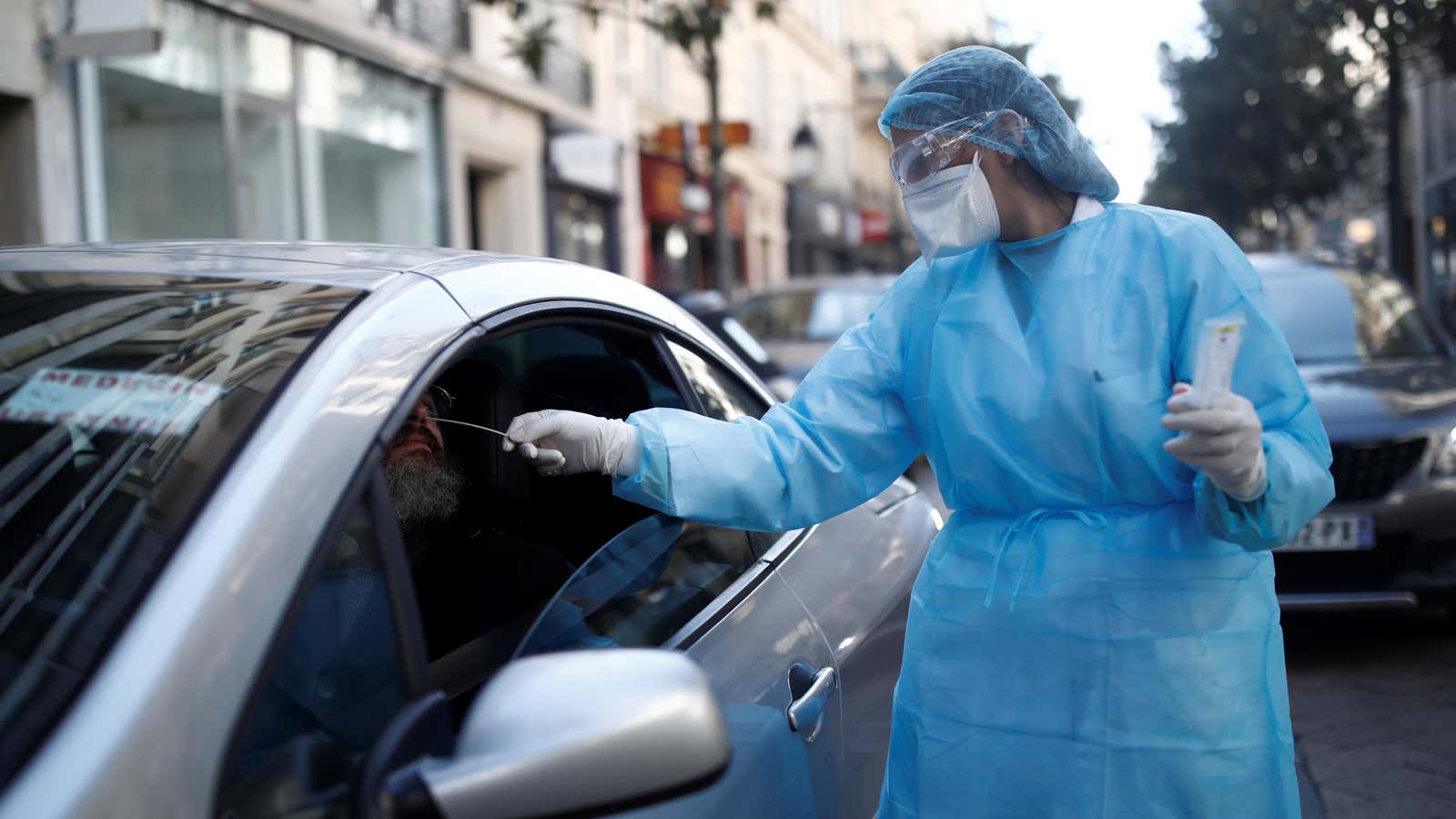From Australia to Italy to the United States, a new surge of Covid-19 tests has cropped up to meet an urgent need for more testing during the coronavirus pandemic.
The molecular tests that search for evidence of viral genetic material—so-called PCR tests—are in short supply. Given the backlog, some nations are turning to other testing methods, and biotech and testing startups are racing to churn out their version of the fastest, cheapest, or most convenient Covid-19 test. In the last week, several have announced at-home tests.
At-home tests could take two main forms. One would would require individuals to swab their own noses and mouths, and send those samples in to a certified lab for PCR processing. Then there’s so-called serologic testing, which tests blood samples for the antibodies the body produces to fight off a coronavirus infection.
But authorities in both the US and the UK suggested that at-home tests carry the risk of inaccurate results—and both have offered shifting guidance on what level of autonomy in testing is appropriate.
Molecular tests
Home diagnostics startup Everlywell was planning on launching a $135 at-home molecular testing kit on March 23. Patients would first complete an online questionnaire. If deemed to be high-risk, they would then be sent the kit, which included overnight shipping to an FDA-cleared lab for PCR analysis.
It announced its test after the FDA issued an updated guidance (pdf) to dramatically expand test capabilities on March 16. While the update stated that some of the new guidelines didn’t apply to at-home tests, some companies jumped the gun. Their logic was their at-home tests met the FDA’s requirements about where the tests were processed: in this case, in specially-certified labs.
But not even four days later, the FDA made itself clear: There are no authorized at-home tests in the US. While at-home molecular tests may use the same processing as lab-run tests, someone who swabs themself might not do a great job, running the risk of a false negative. The FDA issued a separate guidance on Monday (March 23) that allows for the use of self-swab tests—though only if done at an approved health clinic.
That puts a hold on Everlywell’s test, along with similar programs announced by telemedicine and at-home testing companies like Carbon Health, Nurx, and Forward. “Everlywell is working directly with the FDA to understand their recent updates and any potential new guidance that may apply to us,” said Everlywell CEO Julia Cheek.
Some companies, like Wheel and imaware, are trying to work around the FDA guidelines by bringing clinicians to customers’ homes to collect samples. “In our communications with FDA, the agency affirmatively indicated that at-home collection by trained health personnel is permissible under the (…emergency use policy). We have not seen any subsequent communications from FDA that appear to restrict that practice,” wrote Jani Tuomi, co-founder of imaware.
An effort by Amazon Care and the Seattle Coronavirus Assessment Network to deliver at-home tests may also check out. As TechCrunch noted, the Amazon pilot project avoids the use of traditional mail delivery and its drivers are trained in the handling of sensitive medical materials.
Serologic tests
The other class of tests present a different challenge. Serologic tests, which detect antibodies against SARS-CoV-2 in the blood, are a useful way to determine if someone had the virus, says Dr. Timothy Brewer, professor of epidemiology at the UCLA Fielding School of Public Health. Most tests even offer results in under an hour, and they require far less processing.
But they inherently don’t have the same diagnostic power as a molecular test. “Because it takes time for the body’s immune system to generate antibodies against a specific pathogen, antibody tests may be negative early in the course of infection,” said Brewer.
They can also lead to false positives. “Antibody tests sometimes have trouble distinguishing between infections from closely related pathogens,” said Brewer, so they could potentially pick up previous infections with related coronaviruses.
Despite the challenges, companies and countries are pushing forward with blood tests, which would be easier to distribute at massive scale once perfected.
On March 15, Public Health England advised against the use of at-home testing kits for Covid-19, saying not enough is known about them. But on March 25, PHE’s testimony before the Parliament suggested that self-administered fingerprick Covid-19 tests could be available in a matter of days. That would follow moves by Australian regulators, who approved a group of rapid tests on March 23, and Bangladesh’s pharma regulator, which rubber stamped a similar, $3 “dot blot” test.
“If they are incredibly accurate, we will work out the quickest way to release them. If they are not accurate, we will not release any of them,” said Chris Witty, chief medical officer, at a Wednesday press conference on Downing Street.
In the US, meanwhile, telehealth app Lemonaid is partnering with home diagnostics startup Scanwell to deliver an at-home serologic test. “Scanwell is in discussions with the FDA for a separate (…emergency use authorization) that is specific to our test,” Lemonaid CEO Paul Johnson wrote in an email.
Scientists around the world are working on making these blood tests better—whether used at home or at a point of care. A team at Oxford is currently developing a rapid test with built-in-checks to prevent false positives or negatives.
Until then, the only reliable diagnostic tests available to the public rely are traditional swab tests; those are still in very short supply.
